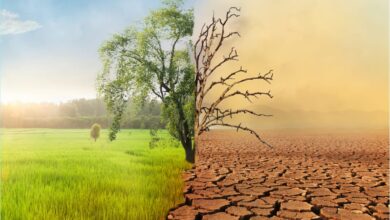
The people of Cape Town, South Africa, are enduring a terrible drought, and the resulting water shortages could soon force authorities to turn off the taps. Could civil unrest follow? When southern Brazil experienced a similar shortage in 2015, stories circulated about the authorities running drills to prepare a response to desperate people attacking water infrastructure. And a study published last year of some 1,800 riots in sub-Saharan Africa over 20 years concluded that drought can indeed be a powerful contributor to civil disorder (C. Almer et al. J. Environ. Econ. Manage. http://doi.org/ckdj; 2017).
Such retrospective analyses raise two questions related to cause and effect: did climate change alter the weather? And did the change in the weather provoke the conflict? Only a solid yes to both can justify bold statements that global warming promotes violence — and establishing this answer is difficult, if not impossible, in many cases.
That hasn’t stopped such controversial claims being made. A decade ago, the United Nations went as far as to state that climate warming and desertification were one of the causes of the Darfur conflict in Sudan, which started in 2003 and led to the deaths of up to half a million people over five years of revolt. That daring claim, based on sketchy information, met with harsh criticism and outright disbelief from researchers familiar with the region. But it also triggered growing interest in climate–conflict research.
Results so far are largely ambiguous and have been frequently questioned by political scientists, economists, social scientists and climate experts, on various grounds. This week, a systematic review of the literature highlights one problem: efforts to find links between climate and social conflict are hampered by a severe sampling bias, including a statistically and politically dubious focus on mainly African countries formerly under British colonial rule.
The study, published in Nature Climate Change, states what critics have long suspected: conclusions that climate change is triggering violent conflict cannot be generalized, and are hard to substantiate even in individual cases (C. Adams et al. Nature Clim. Changehttp://doi.org/ckfw; 2018). Researchers are drawn to regions that experience violence, rather than to those where climate change is most severe, they write. And the countries that are easiest to study — because of historical links, language and ease of transport — are often prioritized over nations that might experience more climate change or more violence, but are less convenient for research. (Kenya is a good example: it is one of the most studied countries, yet it is not near the top of the list in terms of either violence or climate impacts.)
Skewed results pay a disservice to science and can undermine peace-keeping efforts. Climate change is never the sole cause of war, violence, unrest or migration. Syria and Jordan have both been stricken by drought this decade. But it’s clear that different social, political and economic factors in the two nations explain why people are desperate to flee from Syria and not from Jordan.
Done correctly, climate–conflict research is certainly valuable. As a global human enterprise, any science must be concerned with social justice and peace. Rigorous investigation into how climate change might affect — and perhaps violently disrupt — societies or human civilization at large has its place. But first, researchers in the field must improve their methods.
There is a political implication to this sampling bias, too. To search for climate–conflict links in places where violent struggle is taking place, or has only recently ended — and to pursue such research with a geographical bias towards a few, relatively accessible regions in Africa — threatens to stigmatize troubled countries as being prone to even more instability in the future. With a view to social justice in science, this would be grossly undesirable. And it is a flawed approach to answering important questions about the socioeconomic and political conditions in which climate-related conflict is likely to emerge. Instead, scientists must consider whether peaceful responses to climate change are the norm in most countries.
There is a yawning disconnect between the needs of countries in the developing world, many of which sit on the front line of climate change, and the priorities of scientists in the developed world who carry out most of the research. To address this, climate researchers must seek fresh opportunities to provide decision-makers in the developing world with the kinds of data and projections that they most need — including attribution studies, which aim to assess the extent to which specific weather events are due to climate change. This will help the most vulnerable societies mobilize to adapt to climate change, and will offer some much-needed security.
Source: Nature







